九年级英语全一册单元知识点归纳
人教初中英语九年级全一册知识点归纳总结
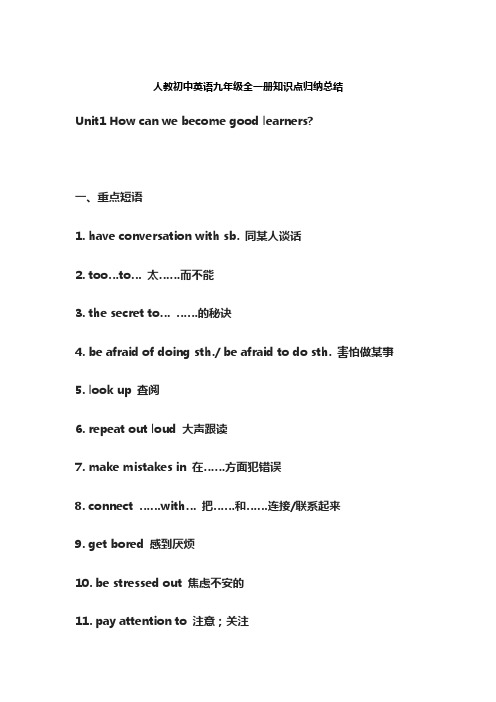
人教初中英语九年级全一册知识点归纳总结Unit1 How can we become good learners?一、重点短语1. have conversation with sb. 同某人谈话2. too…to…太……而不能3. the secret to………的秘诀4. be afraid of doing sth./ be afraid to do sth. 害怕做某事5. look up 查阅6. repeat out loud 大声跟读7. make mistakes in 在……方面犯错误8. connect ……with…把……和……连接/联系起来9. get bored 感到厌烦10. be stressed out 焦虑不安的11. pay attention to 注意;关注12. depend on 取决于;依靠13. the ability to do sth.. 做某事的能力二、考点详解1. by + doing 通过……方式(by是介词,后面要跟动名词,也就是动词的ing形式)2. talk about 谈论,议论,讨论The students often talk about movie after class. 学生们常常在课后讨论电影。
talk to sb= talk with sb 与某人说话3. 提建议的句子:①What/ how about +doing sth.? 做…怎么样?(about后面要用动词的ing形式,这一点考试考的比较多)如:What/ How about going shopping?②Why don't you + do sth.? 你为什么不做…?如:Why don't you go shopping?③Why not + do sth. ? 为什么不做…?如:Why not go shopping?④Let's + do sth. 让我们做…...吧。
初三英语(全一册)知识点汇总
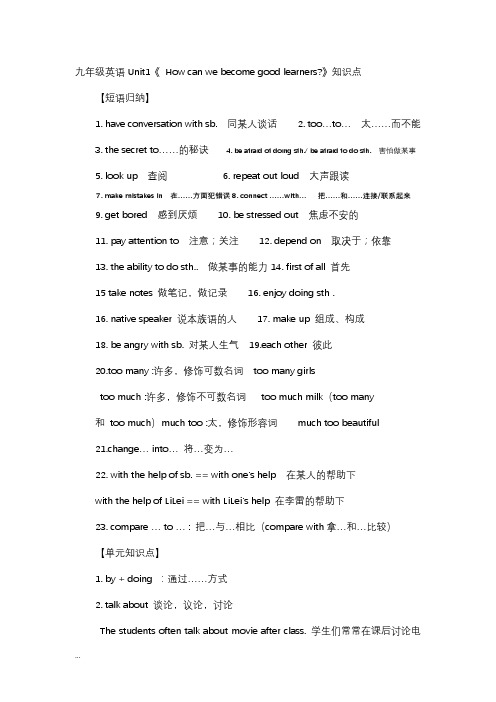
九年级英语Unit1《 How can we become good learners?》知识点【短语归纳】1. have conversation with sb. 同某人谈话2. too…to…太……而不能3. the secret to……的秘诀4. be afraid of doing sth./ be afraid to do sth. 害怕做某事5. look up 查阅6. repeat out loud 大声跟读7. make mistakes in 在……方面犯错误8. connect ……with…把……和……连接/联系起来9. get bored 感到厌烦10. be stressed out 焦虑不安的11. pay attention to 注意;关注12. depend on 取决于;依靠13. the ability to do sth.. 做某事的能力14. first of all 首先15 take notes 做笔记,做记录16. enjoy doing sth .16. native speaker 说本族语的人17. make up 组成、构成18. be angry with sb. 对某人生气 19.each other 彼此20.too many :许多,修饰可数名词 too many girlstoo much :许多,修饰不可数名词 too much milk(too many和 too much)much too :太,修饰形容词 much too beautiful21.change… into…将…变为…22. with the help of sb. == with one's help 在某人的帮助下with the help of LiLei == with LiLei's help 在李雷的帮助下23. compare … to … : 把…与…相比(compare with拿…和…比较)【单元知识点】1. by + doing :通过……方式2. talk about 谈论,议论,讨论The students often talk about movie after class. 学生们常常在课后讨论电影。
Unit1(单元知识清单)九年级英语全一册系列(人教版)

Unit 1 How can we become good learners?重要知识点清单【精讲01 词汇】►►►1.aloud adv.大声地;出声地►►►2. sound作连系动词,“听起来”,其后常跟形容词。
—Listen! What a beautiful sound! ——听!多么美妙的声音!—Yes. It sounds like a bird. ——是的。
它听起来像一只鸟。
【知识拓展】英语中常用的连系动词:一是(be),一感(feel),三保持(keep\remain\stay),二:……起来:(sound, look, smell, taste),三:好像(seem),变了:(get, turn, become)。
四:prove come true go hungry►►►常用结构:be afraid to do sth. 意为“害怕做某事”I am afraid to travel by plane. 我怕乘飞机旅行。
【知识拓展】—Excuse me, may I take the dogs with me, sir? —不好意思,先生,我可以携带狗吗?—It’s afraid not. Pets are not allowed in here. You can keep it in the Animal Center next door.—恐怕不行。
宠物不得进入这里。
你可以把它放在隔壁的动物中心。
►►►4. discoverdiscover是指“发现”原来就有而一直没被发现的东西(如电、煤、石油等矿藏及新星、星系或科学真理等)Scientists have discovered different kinds of ways to treat the illness since 50 years ago.自50年前以来,科学家们已经发现了不同的治疗方法。
Edison invented the light bulb. 爱迪生发明了电灯泡。
九年级全一册英语知识点归纳

新人教版九年级英语全册知识点归纳Unit 1 How can we become good learners? 短语总结:1. good learners 优秀的学习者2. work with friends 和朋友一起学习3. study for a test 备考4.have conversations with 与……交谈5.speaking skills 口语技巧6.a little 有点儿7.at first 起初起先8.the secret to......,.......的秘诀9.because of 因为10.as well 也11.look up (在词典中等)查阅;抬头看12.so that 以便,为了13.the meaning of ……的意思14.make mistakes 犯错误15.talk to 交谈16.depend on 依靠依赖17.in common 共有的18.pay attention to 注意关注19.connect ……with ……把……联系。
20.for example 例如21.think about 考虑22.even if 即使尽管纵容23.look for 寻找24.worry about 担心担忧25.make word cards 制作单词卡片26.ask the teacher for help 向老师求助27.read aloud 大声读28.spoken English 英语口语29.give a report 作报告30.word by word 一字一字地31.so……that 如此……以至于32.fall in love with 爱上33.something interesting 有趣的事情34.take notes 记笔记35.how often 多久一次36.a lot of 许多37.the ability to do sth. 做某事的能力38.learning habits 学习习惯39.be interested in 对……感兴趣40.get bored 感到无聊41.be good at 在……方面擅长42.be afraid of 害怕43.each other 彼此互相44.instead of 代替而不是二.用法集萃1. by doing sth. 通过做某事2.it +be+adj+to do sth. 做某事是……的3.finish doing sth. 完成某事4.what about doing sth.?做某事怎么样?4.try to do sth. 尽力做某事 6.the +比较近,the+比较近越……,就越……7.find it+adj+to do sth. 发现做某事8. be afraid of doing sth. 害怕做某事9.help sb (to) do sth 帮助某人做某事10.practice doing sth 练习做某事11.keep doing sth 一直做某事12.be afraid to do sth 害怕做某事13.begin to do sth 开始做某事14.want to do sth 想要做某事15.need to do sth 需要做某事16.remember to do sth 记得做某事17.shoot 射(射着,射死等表结果)18.shoot at(瞄准)射书面表达(一)假如你是张晓华,下面是你的笔友李军给你写的一封电子邮件。
九年级(全册)英语单元知识点、短语及句型总结

Unit 1一、知识点1.2.By: ①通过…..方式(途径)。
例:I learn English by listening to tapes.②在…..旁边。
例:by the window/the door③乘坐交通工具例:by bus/car④在……之前,到……为止。
例:by October在10月前⑤被例:English is spoken by many people.3.how与what的区别:how通常对方式或程度提问,意思有:怎么样如何,通常用来做状语、表语。
what通常对动作的发出者或接受者提问,意思为什么,通常做宾语,主语。
①How is your summer holiday? It’s OK.(how表示程度做表语)②How did you travel around the world? I travel by air.③What do you learn at school? I learn English, math and many other subjects.①What…think of…? How…like…?②What…do with…? How…deal with…?③What…like about…? How…like…?④What’s the weather like today? How’s the weather today?⑤What to do? How to do it?e.g. What do you think of this book?=How do you like this book?I don’do with the matter.=I don’dealwith it.What do you like about China?=How do you like China?I do n’t know what to do next step?=I don’t know how to do it next step?㊣What good / bad weather it is today!(weather为不可数名词,其前不能加a )㊣What a fine / bad day it is today! (day为可数名词,其前要加 a )4. aloud, loud与loudly的用法: 三个词都与"大声"或"响亮"有关。
人教版九年级全一册英语知识点归纳

Unit 1 How can we become good learners?重点:1.学习并掌握用how来询问做某事的方式;2.学习并掌握by+ving来表达做某事的方法。
难点:动名词在句中充当的成分。
知识点:ask for help寻求帮助work with sb.和……一起工作have conversation with和……一起对话main idea中心思想the secret to……的秘诀word by word逐字take time花时间word group词组body language肢体语言expressions on faces脸上的表情key words关键词as well也look up查看take notes记笔记practice doing sth.练习做某事pen pal笔友keep a diary记日记make mistakes犯错increase增加;提高decrease减少;降低practice with sb.和……一起练习depend on依赖whether or not是否pay attention to sth. / doing sth.注意某事/做某事for a long time很长一段时间connect…with…把……和……连接起来write down写下mind map思维导图lifelong journey终身的旅程on one’s own独自地bit by bit一点点at once马上,立刻It’sa piece of cake.小菜一碟。
It serves you right.你活该。
Use it or lose it.Practice makes perfect.Unit 2 I think that mooncakes are delicious!重点&难点:1. that, if whether引导的宾语从句;2.感叹句的学习和运用。
人教版初中英语九年级全册各单元知识点、语法归纳整理
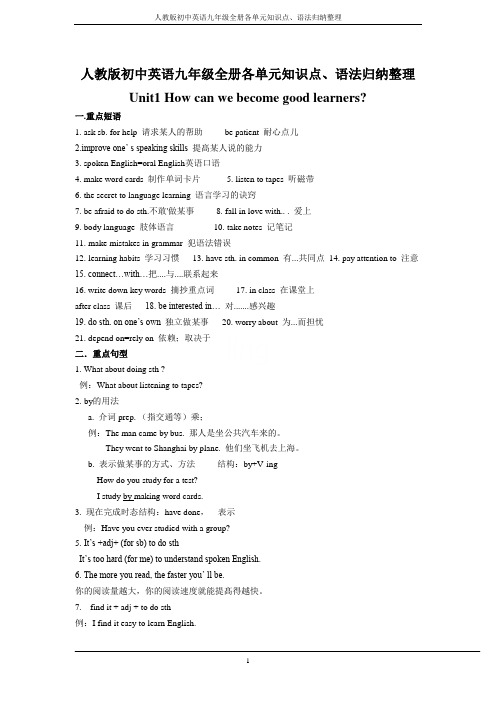
人教版初中英语九年级全册各单元知识点、语法归纳整理Unit1 How can we become good learners?一.重点短语1. ask sb. for help 请求某人的帮助be patient 耐心点儿2.improve one’ s speaking skills 提髙某人说的能力3. spoken English=oral English英语口语4. make word cards 制作单词卡片5. listen to tapes 听磁带6. the secret to language learning 语言学习的诀窍7. be afraid to do sth.不敢'做某事8. fall in love with.. . 爱上9. body language 肢体语言10. take notes 记笔记11.make mistakes in grammar 犯语法错误12.learning habits 学习习惯13. have sth. in common 有...共同点14. pay attention to 注意15. connect…with…把....与....联系起来16. write down key words 摘抄重点词17. in class 在课堂上after class 课后18. be interested in… 对.......感兴趣19. do sth. on one’s own 独立做某事20. worry about 为...而担忧21. depend on=rely on 依赖;取决于二.重点句型1. What about doing sth ?例:What about listening to tapes?2.by的用法a. 介词 prep. (指交通等)乘;例:The man came by bus. 那人是坐公共汽车来的。
九年级英语全一册(1~14单元)知识点归纳
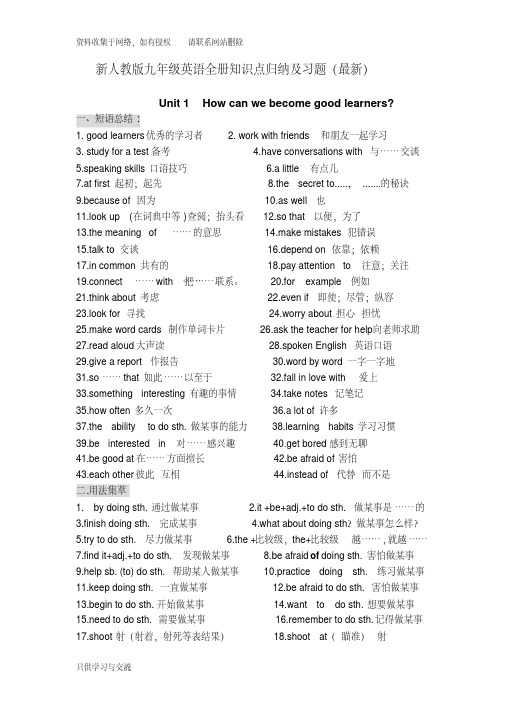
新人教版九年级英语全册知识点归纳及习题(最新)Unit 1 How can we become good learners?一、短语总结:1. good learners 优秀的学习者2. work with friends 和朋友一起学习3. study for a test 备考4.have conversations with 与……交谈5.speaking skills 口语技巧6.a little 有点儿7.at first 起初;起先8.the secret to......,.......的秘诀9.because of 因为10.as well 也11.look up (在词典中等)查阅;抬头看12.so that 以便,为了13.the meaning of ……的意思14.make mistakes 犯错误15.talk to 交谈16.depend on 依靠;依赖17.in common 共有的18.pay attention to 注意;关注把……联系。
20.for example 例如19.connect ……with ……21.think about 考虑22.even if 即使;尽管;纵容23.look for 寻找24.worry about 担心担忧25.make word cards 制作单词卡片26.ask the teacher for help 向老师求助27.read aloud 大声读28.spoken English 英语口语29.give a report 作报告30.word by word 一字一字地31.so……that 如此……以至于32.fall in love with 爱上33.something interesting 有趣的事情34.take notes 记笔记35.how often 多久一次36.a lot of 许多37.the ability to do sth. 做某事的能力38.learning habits 学习习惯39.be interested in 对……感兴趣40.get bored 感到无聊41.be good at 在……方面擅长42.be afraid of 害怕43.each other 彼此互相44.instead of 代替而不是二.用法集萃1. by doing sth. 通过做某事2.it +be+adj.+to do sth. 做某事是……的3.finish doing sth. 完成某事4.what about doing sth.?做某事怎么样?5.try to do sth. 尽力做某事6.the +比较级,the+比较级越……,就越……7.find it+adj.+to do sth. 发现做某事8.be afraid of doing sth. 害怕做某事9.help sb. (to) do sth. 帮助某人做某事10.practice doing sth. 练习做某事11.keep doing sth. 一直做某事12.be afraid to do sth. 害怕做某事13.begin to do sth. 开始做某事14.want to do sth. 想要做某事15.need to do sth. 需要做某事16.remember to do sth. 记得做某事17.shoot 射(射着,射死等表结果)18.shoot at(瞄准)射Unit1 检测题一.单项选择1.—_______ do you study English? —By listening to tapes.A. HowB. WhereC. WhenD. Why2.You can improve your English practicing more. A.by B.with C.of D.in3. Why not practice your _________English in _________ English-speaking country?A. speaking, aB. speaking, anC. spoken, an4. ______conversations with others is one of the secrets to _____a successful learner.A. Practice, becomeB. Practice, becomingC. Practicing, becoming5 ---There’re a few new words in the article? ---What about _________in your dictionary? A. looking it up B. looking up it C. looking them up6. We’ll go out to play ______ it rains tomorrow. A. so B. unless C. because7. Can you __which is the right answer to the question? A. look for B. find C. find out8. Jenny used to be afraid to ________in class, so she always ________nothing.A. speak, talkedB. speak, saidC. say, spoke9.— Why not listen to BBC news to improve your listening skills?C. such; that—It’s ______ difficult _____ I can’t follow. A. too; to B. so; that10. A good learner often thinks about ________he needs to practice more.A. thatB. whatC. how11.--I’m g oing to listen ____the tape. --OK. Remember to listen ____the key words.A. to, toB. to ,forC. for, to12. ________or not you can learn well depends on your learning habits.A. IfB. WeatherC. Whether13. I have finished _________my report. May I start to learn ________the guitar?A. writing, playingB. writing, to playC. to write, playing14. ---I often make mistakes ____grammar. ---Why not ask your teacher ____help?A. in, toB. in, forC. at, to15. _________write down the new words in your notebook?A. Would you likeB. How aboutC. Could you please16. ---Jack used to have ____writing practice. ---Yes, and he had learned ______.A. a lot of, a lot ofB. a lot of, a lotC. a lot, a lot of17. The more careful you are, ________mistakes you’ll make.A. fewerB. the fewerC. the less__mistakes. Instead, they learn ________mistakes.18. Good learners aren’t afraid ___A. of making, inB. to make, fromC. to make, in19. For the first time, pay attention _________quickly to get the main ideas.A. to readB. readingC. to reading20.I discovered that listening to is the secret language learning.A. something interesting, toB. interesting something, toC. something interested, ofD. interested something of21.Jenny found it very easy English well.A. learningB. to learnC. learnD. learned22. He_____ with the girl with golden hair and will soon get married____ her.A. falls in love; toB. is in love; toC. loves; withD. loves; to23. My father thinks _____ is a great way to learn English.A. study grammar.B. I study grammar.C. studying grammar.D. studies grammar24 Why not ___ your teacher for help when you can’t finish _____ it by yourself?A. ask; writeB. to ask; writingC. ask; writingD. asking; write25. — I wonder if I can learn English well.—. All things are difficult before they are easy.A. I am afraid soB. You’re slowC. It takes timeD. It’s a piece of cake26 You’ll find _____________ easy to learn it well. A. thatB. its C. it D. this__________.27. –I don’t have a partner to practice English ____---Why not join an English language club to practice _______________?A. /; speakingB. with; to speakC. /; to speakD. with; speaking28. ---She hardly makes mistakes _________English grammar.---No, it seems that she was born ________the ability to learn languages.A. in, withB. with, inC. in, inD. with, with二用所给单词的适当形式填空。
英语九年级全一册知识点梳理

Unit 1【单元语言知识】一、重点短语:1. face to face 面对面2. as well 也3. look forward to 期望,盼望4. make friends 交朋友5. get on well with 与…相处融洽6. in other words 换句话说8. do some research 做调查9. exchange ideas 交换思想10. help each other 互相帮助11. get together 聚会12. share…with…与…分享14. be different from… 与…不同二、重点句子:1. I look forward to making friends with you. 我期待着和你交朋友。
2. In other words, they both like sports. 换句话说,他们两个都喜欢体育运动。
3. We can help each other with our schoolwork. 我们可以互相帮助办学校的学习。
4. Let’s get together an d share our ideas. 我们聚在一起,分享我们的思想吧。
Unit 2【单元语言知识】一、重点短语:1. write to sb 给人写信3. pass on 传递4. give out 分发,散发6. turn down 关小,调低7. look through 浏览8. too…to 太…而不能9. cut down on 减少10. on edge 紧张不安11. get a good night’s sleep 睡一个好觉12. go to bed early 早点上床睡觉13. face the problem 面对问题14. take it easy 放松,轻松二、重点句子:1. I usually write to my grandparents once a week. 我通常每周给我的祖父母写一封信。
九年级英语全一册单元知识点归纳

单元一:初识英语1.学习英语的目的和重要性:可以增加交流和了解国际文化的能力。
2.英语字母:掌握26个英文字母的大小写形式及发音。
3. 日常问候语:学习常见的问候语,如“Hello”和“How are you?”等。
4.数字和数词的表达:掌握1-100的数字及表达方法。
5.人称代词:学习人称代词的主格和宾格形式。
单元二:学校生活2. 学科和课程:了解不同学科的英语名称,如“mathematics”和“history”等。
3. 日常活动表达:学会用英语描述日常学校生活的活动,如“havea PE lesson”和“do homework”等。
4.提出请求和建议的方式:掌握用英语表达请求和建议的常用句型。
单元三:生活方式1. 家庭成员和关系:掌握家庭成员的称谓,如“father”和“sister”等。
2. 家务活动的表达:学习用英语描述家庭日常活动的词汇,如“clean the house”和“cook dinner”等。
3. 日常时间表达:学习用英语表达日常时间的词汇,如“get up”和“go to bed”等。
4.描述个人喜好和不喜欢的方式:学习用英语描述个人喜好和不喜欢的常用句型。
单元四:人与自然1. 天气和气候:学习用英语表达不同天气和气候的词汇,如“sunny”和“rainy”等。
2. 自然灾害:了解常见的自然灾害的英文表达,如“earthquake”和“typhoon”等。
3. 动植物的分类和特征:学习动植物的英文名称和常见特征,如“mammal”和“evergreen tree”等。
4.保护自然环境的重要性:了解保护环境的重要性及相关的词汇和句型。
单元五:日常交流1.日常购物:学习用英语购物的常用表达,如问价和讨价还价等。
2.在餐厅点菜:掌握在餐厅点菜和服务的基本词汇和句型。
3.路线指示和交通工具:学习用英语问路和表达交通方式的常用词汇和句型。
4.约会和活动安排:掌握用英语表达约会和活动安排的常用句型。
英语九年级全一册知识点笔记

英语九年级全一册知识点笔记以下是英语九年级全一册的部分知识点笔记:1. 宾语从句:宾语从句是句子作宾语。
引导宾语从句的连词有:that,if,whether,(口语中常省略)。
作宾语从句的句子在复合句中能充当一个成分。
2. 被动语态:被动语态表示主语是动作的接受者。
被动语态的结构为“be+过去分词”。
3. 情态动词:情态动词表示说话人的态度,意思为“可能”、“可以”、“应当”、“必须”等。
常用的情态动词有can、may、must、should等。
4. 非谓语动词:非谓语动词是指在句子中不是谓语的动词,主要包括不定式、动名词和分词(现在分词和过去分词)等形式。
5. 动词不定式:动词不定式是英语中的一种非谓语动词形式,由“to+动词原形”构成。
在句子中可以作主语、宾语、表语、定语和状语等成分。
6. 现在分词和过去分词:现在分词和过去分词是非谓语动词的一种形式,分别表示正在进行的动作和已经完成的动作。
现在分词由“动词原形+ing”构成,过去分词由“动词原形+ed”构成。
7. 虚拟语气:虚拟语气是一种表示与事实相反或实现的可能性很小的假设语气,常常用在条件状语从句和让步状语从句中。
8. 并列连词:并列连词用来连接并列关系的句子或短语,常用的并列连词有and、or、but、so等。
9. 状语从句:状语从句是用来修饰主句中的动词、形容词或副词的从句,表示时间、地点、原因、条件、让步等关系。
10. 定语从句:定语从句是用来修饰名词或代词的从句,表示所属、性质、状态等关系。
引导定语从句的连词有that、which、who(指人)、whose (指人或物)等。
以上只是部分知识点的简要概述,建议查阅教辅练习或咨询教师以获取更全面的信息。
九年级英语一到三单元知识点

九年级英语一到三单元知识点Unit 1 How can we become good learners?一、重点单词。
1. textbook (n.) 教科书;课本。
2. conversation (n.) 交谈;谈话,常用于短语“have a conversation with sb.”(与某人交谈)3. aloud (adv.) 大声地;出声地。
区别于“loud”(adj. 大声的,常用来修饰名词,如a loud voice)和“loudly”(adv. 喧闹地,侧重于嘈杂、喧闹的声音)。
例如:Read aloud to practice pronunciation.(大声朗读来练习发音。
)4. pronunciation (n.) 发音;读音。
例如:His pronunciation is very good.(他的发音很好。
)5. sentence (n.) 句子。
6. patient (adj.) 有耐心的;n. 病人。
常用搭配“be patient with sb.”(对某人有耐心)。
例如:Our teacher is patient with us.(我们的老师对我们很有耐心。
)7. expression (n.) 表达(方式);表示;表情。
例如:Facial expressions can show our feelings.(面部表情能展示我们的情感。
)二、重点短语。
1. make word cards 制作单词卡片。
2. listen to tapes 听磁带。
3. ask the teacher for help 向老师求助。
4. read aloud 大声朗读。
5. have conversations with 与……交谈。
6. give a report 作报告。
7. word by word 逐字地。
8. the secret to... ……的秘诀。
例如:The secret to success is hard work.(成功的秘诀是努力工作。
九年级英语全册各单元知识点总结

九年级英语全册各单元知识点总结Unit 1 How can we become good learners?一、短语:1.have conversation with sb. 同某人谈话2.connect …with… 把…和…连接/联系起来3.the secret to… ……的秘诀4.be afraid of doing sth./to do sth. 害怕做某事5.look up 查阅6.repeat out loud 大声跟读7.make mistakes in 在……方面犯错误8.get bored 感到厌烦9.be stressed out 焦虑不安的10.pay attention to 注意;关注11.depend on 取决于;依靠12.the ability to do sth. 做某事的能力二、知识点:1. by + doing:通过……方式(by是介词,后面要跟动名词,也就是动词的ing形式);2. a lot:许多,常用于句末;3. aloud, loud与loudly的用法,三个词都与“大声”或“响亮”有关。
①aloud是副词,通常放在动词之后。
②loud可作形容词或副词。
用作副词时,常与speak, talk, laugh等动词连用,多用于比较级,须放在动词之后。
③loudly是副词,与loud同义,有时两者可替换使用,可位于动词之前或之后。
4. not …at all:一点也不,根本不,not经常可以和助动词结合在一起,at all 则放在句尾;5. be / get excited about sth.:对…感到兴奋;6. end up doing sth:终止/结束做某事;end up with sth.:以…结束;7. first of all:首先(这个短语可用在作文中,使得文章有层次);8. make mistakes:犯错make a mistake 犯一个错误;9. laugh at sb.:笑话;取笑(某人)(常见短语)10. take notes:做笔记/记录;11. native speaker 说本国语的人;12. make up:组成、构成;13. deal with:处理、应付;14. perhaps = maybe:也许;15. go by:(时间)过去;16.each other:彼此;17.regard… as … :把…看作为…;18.change… into…:将…变为…;19. with the help of sb. = with one's help 在某人的帮助下(注意介词of和with,容易出题)20. compare … to …:把…比作… compare with 拿…和…作比较;21. instead:代替,用在句末,副词;instead of sth / doing sth:代替,而不是(这个地方考的较多的就是instead of doing sth,也就是说如果of后面跟动词时,要用动名词形式,也就是动词的ing形式)22.Shall we/ I + do sth.? 我们/我…好吗?23. too…to:太…而不能,常用的句型是too+形容词/副词+ to do sth.Unit 2 I think that moon cakes are delicious!一、短语:1. the Lantern Festival 元宵节2. the Dragon Boat Festival 端午节3. the Water Festival 泼水节4. remind sb. of 使某人想起5. eat five meals a day 一天吃五餐6. put on five pounds 体重增加了五磅7. treat sb. with. 用/以……对待某人8. be similar to... 与.......相似9. end up 最终成为/处于10. share sth. with sb. 与……分享……11. as a result结果12. one... the other... (两者中的) 一个…另一个…13. take sb. out for dinner 带某人出去吃饭14. dress up 乔装打扮15. haunted house 鬼屋16. the beginning of new life 新生命的开始二、知识点:1.宾语从句:(三大考点:引导词、时态和语序。
九年级全一册英语知识点总结

2. where I’m from , we’re pretty relaxed about time. 在我们那个地方,我们的时间观念比较随意
3. We often just drop by our friends’ homes. 我们时常去朋友家拜访
2. What do you like best about… What do you like best about the Dragon Boat Festival?
3. what a great day! 感叹句句:多么美好的一天!
4.I wonder if ….我想知道 I wonder if it’s similar to Water Festival of the Dai people
Unit 3 Could you please tell me where the restrooms are?
问路常用的句子: 1. Do you know where…is? 2. Can you tell me how I can get to…? 3. Could you tell me how to get to….? 4. Could /will/would you please tell me sth.? 例句: Could you tell me how to get to the park?
3. what do you dislike about this CD. 你不喜欢这张CD的什么?
4. what does it remind you of ? 它使你想起了什么?
5. it does have a few good features, though. 然而,他的确有好的方面
九年全一册英语知识点归纳总结

九年全一册英语知识点归纳总结九年全一册英语知识点归纳总结一、语法知识点总结1. 时态英语中的时态包括一般现在时、一般过去时、一般将来时、现在进行时、过去进行时、过去将来时等。
在日常交流中,正确运用时态可以使语言更加准确清晰。
2. 动词时态和语态变化动词时态和语态的变化是英语语法中的重要内容。
动词时态分为两大类:一般时态和完成时态。
语态分为主动语态和被动语态。
3. 名词英语名词可分为可数名词和不可数名词。
可数名词有单数和复数形式,不可数名词则没有复数形式。
4. 代词代词在英语语法中占据重要地位,它的作用是代替名词。
代词包括人称代词、物主代词、指示代词、反身代词等。
5. 冠词冠词在英语中起到限定名词的作用。
英语中的冠词分为定冠词和不定冠词。
6. 形容词和副词形容词描述名词的特征,而副词则用来修饰动词、形容词和其他副词。
7. 从句从句是由主句和从句构成的复合句。
从句可分为定语从句、宾语从句、状语从句等。
8. 并列连词和从属连词并列连词用于连接两个同等重要的词、短语、从句等。
从属连词用于连接主句和从句。
9. 句型变化英语句型包括陈述句、否定句、疑问句、感叹句、祈使句等。
不同的句型有不同的语序和结构。
二、词汇知识点总结1. 动词短语动词短语是指由一个或多个动词构成的短语。
动词短语可以表示动作、状态、情感等。
2. 名词短语名词短语是由一个或多个名词构成的短语。
名词短语可以作为主语、宾语、表语等。
3. 形容词短语形容词短语是由一个或多个形容词构成的短语。
形容词短语通常用于修饰名词或代词。
4. 副词短语副词短语是由一个或多个副词构成的短语。
副词短语通常用于修饰动词、形容词和其他副词。
5. 介词短语介词短语是由一个介词和它的宾语构成的短语。
介词短语可以表示时间、地点、原因等。
6. 段落开头常见句型在英语写作中,段落开头常见的句型有:介绍主题、列举观点、进行对比、引用名人名言、提出问题等。
7. 连词的用法连词在句子中起到连接词语、短语、从句等的作用。
人教版初中英语九年级全册各单元知识点、语法归纳整理
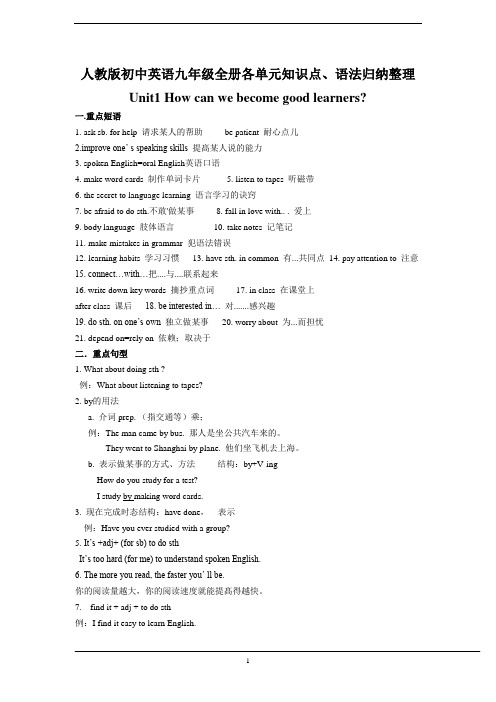
人教版初中英语九年级全册各单元知识点、语法归纳整理Unit1 How can we become good learners?一.重点短语1. ask sb. for help 请求某人的帮助be patient 耐心点儿2.improve one’ s speaking skills 提髙某人说的能力3. spoken English=oral English英语口语4. make word cards 制作单词卡片5. listen to tapes 听磁带6. the secret to language learning 语言学习的诀窍7. be afraid to do sth.不敢'做某事8. fall in love with.. . 爱上9. body language 肢体语言10. take notes 记笔记11.make mistakes in grammar 犯语法错误12.learning habits 学习习惯13. have sth. in common 有...共同点14. pay attention to 注意15. connect…with…把....与....联系起来16. write down key words 摘抄重点词17. in class 在课堂上after class 课后18. be interested in… 对.......感兴趣19. do sth. on one’s own 独立做某事20. worry about 为...而担忧21. depend on=rely on 依赖;取决于二.重点句型1. What about doing sth ?例:What about listening to tapes?2.by的用法a. 介词 prep. (指交通等)乘;例:The man came by bus. 那人是坐公共汽车来的。
九年级全册英语知识点归纳

一、语法
1.一般现在时、一般过去时、一般将来时的使用和构成
2.现在进行时、过去进行时的构成和用法
3.现在完成时、过去完成时的构成和用法
4.直接引语和间接引语的转换
5.省略句的构成和使用
6.被动语态的构成和使用
7.定语从句和名词性从句的用法
8.感叹句和条件句的构成和用法
9.并列连词、从属连词和关系词的使用
10.数词、形容词、副词的用法和比较级、最高级的构成
11.介词和介词短语的使用
12.情态动词的用法和构成
二、词汇
1.各类词汇的拼写和发音规则
2.常用动词、名词、形容词、副词的用法和搭配
3.各类介词的用法
4.常用短语和习惯用语的应用
5.常用句型和固定搭配的用法
三、阅读理解
1.根据文章的标题、首句、尾句、关键词等进行文章的整体理解
2.根据上下文和词汇推测词义
3.理解和分析文章中的事实细节和主旨
4.分析和解答文章中的推理和引申问题
5.根据文章内容回答问题、总结归纳并进行有关话题的讨论
四、写作
1.根据提示和要求进行句子、短文的写作
2.根据图片或图表进行写作并描述所给信息
3.根据所学内容进行自由写作并流畅表达自己的观点
4.根据所给材料和要求进行信件、日记、倒序叙述等不同文体的写作
5.使用复杂句型和连接词进行段落和篇章的组织和衔接
以上仅是九年级全册英语知识点的一部分,每个单元和课文中还涉及很多具体的语法点、词汇和表达方式。
在学习过程中,应该结合课本和习题进行练习和巩固,才能更好地掌握这些知识点。
同时,还需要注重拓宽自己的阅读广度和写作能力,提高语言的运用和表达能力。
九年级英语全册知识点大汇总

1.语法知识点:-时态:一般现在时、一般过去时、一般将来时、现在进行时、过去进行时、现在完成时、过去完成时、将来完成时等。
-名词:可数和不可数名词、复数名词的构成规则、名词所有格等。
-代词:人称代词、物主代词、反身代词、指示代词、不定代词等。
-形容词和副词:比较级和最高级、形容词和副词的用法和位置等。
-介词:常见的介词及其用法、介词短语等。
-冠词:定冠词和不定冠词的用法和位置等。
-动词:不规则动词的过去式和过去分词形式、情态动词的用法等。
-从句:宾语从句、主语从句、定语从句、状语从句等。
-名词性从句:主语从句、宾语从句、表语从句、同位语从句等。
-倒装:部分倒装、完全倒装等。
2.句型转换:- 肯定句变否定句:在动词前加助动词“do not”或“does not”。
- 否定句变疑问句:将助动词“do not”或“does not”置于主语之前。
- 一般疑问句变陈述句:将助动词“do”或“does”去掉。
-特殊疑问句的构成和回答方式。
3.宾语从句:- 引导词:that, if, whether等。
-时态和语序:宾语从句中的时态和主句的主谓一致,语序和陈述句一样。
4.定语从句:- 引导词:关系代词who, whom, whose, which, that等;关系副词where, when, why等。
-关系代词和关系副词的选择和使用。
-非限制性定语从句和限制性定语从句的区别和用法。
-定语从句中的时态和语序。
5.状语从句:- 引导词:时间状语从句(when, while, before, after, since, until等)、条件状语从句(if, unless, as long as, in case等)、地点状语从句(where, wherever等)、方式状语从句(as, as if, as though等)、原因状语从句(because, since, as等)、结果状语从句(so that, such… that等)等。
九年级全册英语知识点归纳

九年级全册英语知识点归纳一、名词(Noun)名词是指表示人、物、事物、地点等具体或抽象概念的名称。
在句子中可作主语、宾语、表语、定语或宾补等。
1. 可数名词(Countable Nouns)和不可数名词(Uncountable Nouns)可数名词可以用单数或复数形式表示;不可数名词只有单数形式。
2. 特殊名词特殊名词是指表示某一类事物或人的名称,例如国名、姓氏等。
它们的复数形式有其自身的规则。
二、代词(Pronoun)代词是用来代替名词的词语,可以用来指示、提及、引用以及回避。
1. 主格代词(Subjective Pronouns)主格代词用来作主语。
2. 宾格代词(Objective Pronouns)宾格代词用来作宾语。
3. 物主代词(Possessive Pronouns)物主代词用来表示所有关系。
4. 反身代词(Reflexive Pronouns)反身代词单独使用表示强调,同时也可以作为宾语。
三、动词(Verb)动词是指表示行为、状态或存在的词语。
作为句子的核心,它可以有不同的时态、语态和情态。
1. 时态(Tense)时态是动词表达的时间概念,包括一般现在时、一般过去时、一般将来时等。
2. 语态(Voice)语态是指动作的执行者和承受者之间的关系,包括主动语态和被动语态。
3. 情态(Modal Verbs)情态动词用来表示可能性、能力、建议、允许等。
四、形容词(Adjective)形容词用来描述名词或代词,提供关于其性质、特征或状态的信息。
1. 形容词的比较级和最高级形容词可以有原级、比较级和最高级形式,用来表示不同程度的大小、高低等。
五、副词(Adverb)副词用来修饰动词、形容词、其他副词或全句,表示时间、地点、方式、原因等。
1. 频度副词(Adverbs of Frequency)频度副词用来表示动作发生的频率。
六、介词(Preposition)介词连接名词、代词或动词与其他词,表达时间、地点、方式、原因等。
- 1、下载文档前请自行甄别文档内容的完整性,平台不提供额外的编辑、内容补充、找答案等附加服务。
- 2、"仅部分预览"的文档,不可在线预览部分如存在完整性等问题,可反馈申请退款(可完整预览的文档不适用该条件!)。
- 3、如文档侵犯您的权益,请联系客服反馈,我们会尽快为您处理(人工客服工作时间:9:00-18:30)。
九年级英语全一册单元知识点归纳Standardization of sany group #QS8QHH-HHGX8Q8-GNHHJ8-HHMHGN#新人教版九年级英语全册知识点归纳及习题(最新)Unit 1 How can we become good learners一、短语总结:1. good learners 优秀的学习者2. work with friends 和朋友一起学习3. study for a test 备考 conversations with 与……交谈skills 口语技巧 little 有点儿first 起初;起先 secret to......, .......的秘诀of 因为 well 也up (在词典中等)查阅;抬头看 that 以便,为了meaning of ……的意思 mistakes 犯错误to 交谈 on 依靠;依赖common 共有的 attention to 注意;关注……with ……把……联系。
example 例如about 考虑 if 即使;尽管;纵容for 寻找 about 担心担忧word cards 制作单词卡片 the teacher for help 向老师求助aloud 大声读 English 英语口语a report 作报告 by word 一字一字地……that 如此……以至于 in love with 爱上interesting 有趣的事情 notes 记笔记often 多久一次 lot of 许多ability to do sth. 做某事的能力 habits 学习习惯interested in 对……感兴趣 bored 感到无聊good at 在……方面擅长 afraid of 害怕other 彼此互相 of 代替而不是二.用法集萃1. by doing sth. 通过做某事 +be+adj.+to do sth. 做某事是……的doing sth. 完成某事 about doing sth.做某事怎么样to do sth. 尽力做某事 +比较级,the+比较级越……,就越……it+adj.+to do sth. 发现做某事 afraid of doing sth. 害怕做某事sb. (to) do sth. 帮助某人做某事 doing sth. 练习做某事doing sth. 一直做某事 afraid to do sth. 害怕做某事to do sth. 开始做某事 to do sth. 想要做某事to do sth. 需要做某事 to do sth. 记得做某事射(射着,射死等表结果) at(瞄准)射Unit1 检测题一.单项选择1.—_______ do you study English —By listening to tapes.A. HowB. WhereC. WhenD. Whycan improve your English practicing more.3. Why not practice your _________English in _________ English-speaking countryA. speaking, aB. speaking, anC. spoken, an4. ______conversations with others is one of the secrets to_____a successful learner.A. Practice, becomeB. Practice, becomingC. Practicing, becoming5 ---There’re a few new words in the article ---What about _________in your dictionary A. looking it up B. looking up it C. looking them up6. We’ll go out to play ______ it rains tomorrow. A. so B. unless C. because7. Can you __which is the right answer to the question A. look for B. find C. find out8. Jenny used to be afraid to ________in class, so she always ________nothing.A. speak, talkedB. speak, saidC. say, spoke9.— Why not listen to BBC news to improve your listeningskills—It’s ______ difficult _____ I can’t follow. A. too; to B. so; that C. such; that10. A good learner often thinks about ________he needs to practice more.A. thatB. whatC. how’m g oing to listen ____the tape. --OK. Remember to listen____the key words.A. to, toB. to ,forC. for, to12. ________or not you can learn well depends on your learning habits.A. IfB. WeatherC. Whether13. I have finished _________my report. May I start to learn________the guitarA. writing, playingB. writing, to playC. to write, playing14. ---I often make mistakes ____grammar. ---Why not ask your teacher ____helpA. in, toB. in, forC. at, to15. _________write down the new words in your notebookA. Would you likeB. How aboutC. Could you please16. ---Jack used to have ____writing practice. ---Yes, and he had learned ______.A. a lot of, a lot ofB. a lot of, a lotC. a lot, a lot of17. The more careful you are, ________mistakes you’ll make.A. fewerB. the fewerC. the less18. G ood learners aren’t afraid _____mistakes. Instead, they learn ________mistakes.A. of making, inB. to make, fromC. to make, in19. For the first time, pay attention _________quickly to get the main ideas.A. to readB. readingC. to readingdiscovered that listening to is the secret language learning.A. something interesting, toB. interesting something, toC. something interested, ofD. interested something offound it very easy English well.A. learningB. to learnC. learnD. learned22. He_____ with the girl with golden hair and will soon get married____ her.A. falls in love; toB. is in love; toC. loves; withD. loves; to23. My father thinks _____ is a great way to learn English.A. study grammar.B. I study grammar.C. studying grammar.D. studies grammar24 Why not ___ your teacher for help when you can’t finish_____ it by yourselfA. ask; writeB. to ask; writingC. ask; writingD. asking; write25. — I wonder if I can learn English well.—. All things are difficult before they are easy. A. I am afraid so B. You’re slow C. It takes time D. It’s a piece of cake26 You’ll find _____________ easy to learn it well. A. thatB. itsC. itD. this27. –I don’t have a partner to practice English______________.---Why not join an English language club to practice_______________A. /; speakingB. with; to speakC. /; to speakD. with; speaking28. ---She hardly makes mistakes _________English grammar.---No, it seems that she was born ________the ability to learn languages.A. in, withB. with, inC. in, inD. with, with二用所给单词的适当形式填空。
